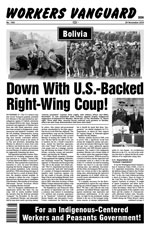
The Proletariat in Underdeveloped Countries (Quote of the Week) In a manifesto adopted by the 1940 Emergency Conference of the Fourth International, revolutionary leader Leon Trotsky underlined that in neocolonial countries, liberation from imperialism and the local bourgeoisie requires that the proletariat stand at the head of the oppressed masses as the driving force of socialist revolution. This perspective requires building revolutionary workers parties, as part of a reforged Fourth International, to lead the workers to power and to link their struggles in backward countries with those in the imperialist centers. Only under its own revolutionary direction is the proletariat of the colonies and the semicolonies capable of achieving invincible collaboration with the proletariat of the metropolitan centers, and with the world working class as a whole. Only this collaboration can lead the oppressed peoples to complete and final emancipation, through the overthrow of imperialism the world over. A victory of the international proletariat will deliver the colonial countries from the long-drawn-out travail of capitalist development, by opening up the possibility of arriving at socialism hand in hand with the proletariat of the advanced countries. The perspective of the permanent revolution in no case signifies that the backward countries must await the signal from the advanced ones, or that the colonial peoples should patiently wait for the proletariat of the metropolitan centers to free them. Help comes to him who helps himself. Workers must develop the revolutionary struggle in every country, colonial or imperialist, where favorable conditions have been established, and through this set an example for the workers of other countries. Only initiative and activity, resoluteness and boldness can really materialize the slogan “Workers of the world, unite!” —Leon Trotsky, “Manifesto of the Fourth International on the Imperialist War and the Proletarian World Revolution” (May 1940)
|
|
||||||||||||||||||||||||||||||||||||||


